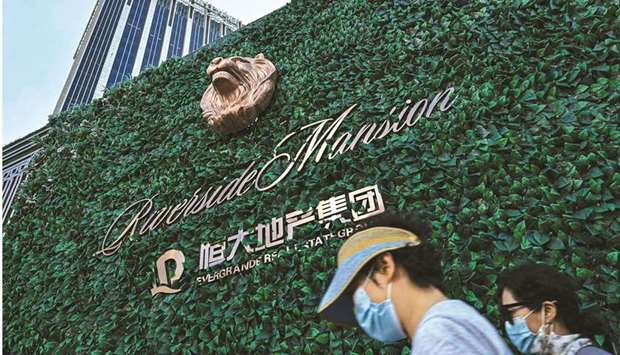
People walk past a residential building developed by Evergrande in Pudong district in Shanghai on September 22. In a recent meeting with Evergrande representatives, regulators said the company should communicate proactively with bondholders to avoid a default but didn’t give more specific guidance, a person familiar with the matter said.
Financial regulators in Beijing issued a broad set of instructions to China Evergrande Group, telling the embattled developer to focus on completing unfinished properties and repaying individual investors while avoiding a near-term default on dollar bonds.
In a recent meeting with Evergrande representatives, regulators said the company should communicate proactively with bondholders to avoid a default but didn’t give more specific guidance, a person familiar with the matter said. The developer had an $83.5mn coupon due Thursday, with a 30-day grace period to make the payment.
There’s no indication that regulators offered financial support to Evergrande for the bond payment, and it’s unclear whether officials believe the company should eventually impose losses on offshore creditors. Policy makers are trying to learn more about who holds Evergrande’s bonds, the person said, asking not to be identified discussing sensitive information.
A lack of clear public communication from senior Chinese leaders on Evergrande has left the company’s fate shrouded in uncertainty. Dow Jones reported on Thursday that authorities instructed local government agencies and state-owned enterprises to step in only at the last minute should Evergrande fail to manage its affairs in an orderly fashion. Authorities have signalled a reluctance to bail out the developer, according to Dow Jones, which cited officials familiar with the discussions.
Fears of an Evergrande failure have caused a sharp rise in borrowing costs for other junk-rated Chinese developers and cast doubt on the health of some smaller Chinese banks. Individual investors, homebuyers and suppliers have staged protests at Evergrande offices across the country, while markets from Hong Kong to New York have convulsed this week as traders weighed the prospect of financial contagion from the world’s most indebted developer.
Even though Evergrande’s crisis can be traced in part to the campaign to rein in over-leveraged property companies and discourage moral hazard, the government is unlikely to welcome a messy default that could threaten economic and social stability. Large cash injections into the financial system by the People’s Bank of China in recent days suggest policy makers are already focused on shoring up sentiment.
Evergrande, the PBOC and the nation’s financial and housing regulators didn’t immediately respond to requests for comment. Two holders of the dollar bond with a coupon due Thursday said they hadn’t received payment as of 5pm Hong Kong time.
Speculation that Evergrande may avoid a worst-case scenario helped lift its bonds and stock on Thursday. The company’s 8.25% dollar note due 2022 climbed 6.7 cents on the dollar to 31.9 cents as of 7.09pm local time, hitting session highs after Bloomberg reported regulators’ instructions to Evergrande. The bonds pared some of their gains after the Dow Jones report and are still pricing in expectations of a deep haircut. Shares jumped 18% in Hong Kong before the Bloomberg report, paring this year’s loss to 82%.
The rally was fuelled in part by a vaguely worded statement from Evergrande on Wednesday, in which the company said an interest payment on one of its yuan-denominated bonds had been “resolved via negotiations off the clearing house.”
The developer likely struck a deal with local bondholders to postpone the payment without having to label the move a default, analysts said.
It’s unclear whether Evergrande would be able to pull off something similar for its dollar bonds. While some of the notes are likely owned by billionaire founder Hui Ka Yan and his associates, holders also include global investment firms that might be less willing to go along with opaque payment arrangements.
